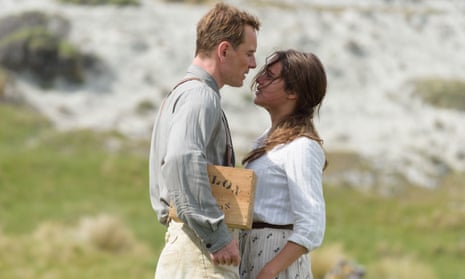Prepare for a massive bull market in Kleenex shares. There are oceans of tears in this surging and swirling emotional melodrama from writer-director Derek Cianfrance, adapted from the 2012 bestseller by Australian author ML Stedman.
Unashamedly and even ruthlessly sentimental, this film tugs away at your heartstrings like it’s ringing in the new year. A new Richter scale may have to be devised to measure the mass audience lip-trembling. Never mind “weepie” – it’s a sobbie, a blubberie and (for certain tight-lipped male critics in the audience) a secret-snifflie.
Cianfrance had his breakthrough with a movie called Blue Valentine. But there could hardly be a valentine bluer than this. There’s something extravagant and frankly preposterous about its sadness and its tale of romantic sacrifice: a crazy mix of Nicholas Sparks’s Message in a Bottle and Shakespeare’s The Winter’s Tale. The Light Between Oceans isn’t subtle – that swoony title should tip you off – and it’s a fair way from the realist grit of the less obviously commercial pictures Cianfrance has made previously. There’s more corn in the recipe here, a bit more ham and cheese. But he carries it off with forthright defiance and with strong, heartfelt, ingenuous performances from Alicia Vikander and Michael Fassbender. The end result is no guilty pleasure, more like a massively innocent helping of low-cal pain: the movie equivalent of Noël Coward’s “potent cheap music”, perhaps.
Fassbender plays Tom Sherbourne, a young Australian ex-serviceman in 1919 who is psychologically scarred by his experiences of war. Yearning for quiet and solitude, he takes a job as a lighthouse keeper on the beautiful, remote island of Janus Rock, named after the twin-faced god whose duality is to be so metaphorically important. Before heading off, he is welcomed by the local community on the nearby mainland, particularly a beautiful young woman, Isabel Graysmark (Vikander) who is herself emotionally wounded by the loss of her brothers in the war. They marry and he takes Isabel to what amounts to his private island kingdom.
At first they are blissfully happy, with Isabel tenderly trimming Tom’s soldierly moustache. But their efforts to have children end in miscarriage and disaster, the solitude amplifies their depression unbearably, and Isabel seems on the verge of a complete catatonic breakdown. Then they are saved – or damned – by what seems like a miracle: a rowing-boat washes up with a dead man aboard and a tiny, crying baby.

Tom sees how looking after the baby has cured Isabel and suppresses his qualms to cover up this maritime disaster, bury the man’s body and pass off the baby as their own. It is a crime that lies buried in the shallow grave of their dual conscience, rising to the surface when Tom and Isabel come to the mainland for their baby’s christening and they make a Hardyesque discovery in the churchyard: the baby is real, with a grieving mother (Rachel Weisz) whose own story of loss plays out in contradistinction to their own troubled gain.
It is a Solomonic agony of choice: between rival mothers and then between loyalty to spouse or child. In many ways, the film’s most purely touching moments are those before the deafening cymbal-clash of tragedy – when Tom and Isabel’s relatively normal life together is beginning to sour and the dull disappointments of normality are beginning to take hold; when the couple are beginning to wonder how and if they can make their way through this. At the very beginning in fact, The Light Between Oceans could be the scene for some tale of the supernatural, or perhaps some kind of domestic psychological thriller, a variation on Patrick Hamilton.
I’m not being entirely facetious when I say the opening act’s anxieties are the Jekyll to the Hyde of Rosemary’s Baby. Then we hit those big crashing notes; Alexandre Desplat’s score is clearly looking for something like Elgar, and Adam Arkapaw’s cinematography often favours the woozy glow of light sources directly into camera, but cleanses the palate between scenes with giant, crisply detailed romantic sea- and cloudscapes.
You will need a bit of a sweet tooth for some of the flavour in The Light Between Oceans, but there is tremendous confidence and it is hugely watchable. It will put you in a wobbly sort of trance.

Comments (…)
Sign in or create your Guardian account to join the discussion